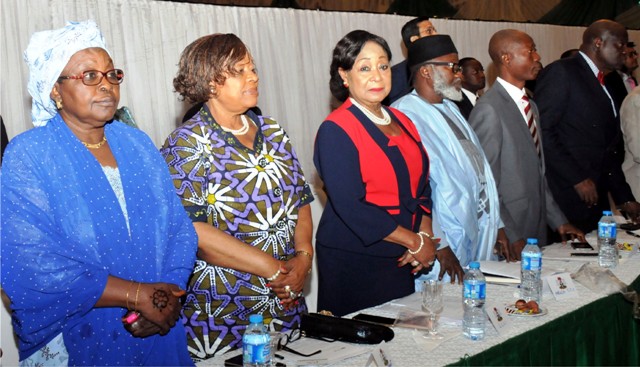Business
TCN Lists Gains Of Transmission Line Expansion

The Transmission Company of Nigeria (TCN) says its current transmission expansion initiative is designed to increase the nation’s grid transmission capacity to 20,000 mega watts in the next three years.
TCN’s Managing Director, Mr Usman Mohammed, disclosed this at a meeting in Abuja on the impact assessment study for the second Ikeja West 330kv transmission reinforcement project.
The meeting between TCN and West Africa Power Pool (WAPP) was designed to kick start discussions on the study and completion of the Ikeja West 330kv transmission line .
The line was designed to supply electricity from Nigeria to Benin Republic and the West Africa sub-region.
Mohammed said it was necessary to begin the discussion to complete the second Ikeja West 330kv transmission line given the increase in demand for more power from the grid .
He also said that TCN had recorded some achievements in stabilising the grid, adding that the stability had heightened the prospect of the interconnection of Nigerian grid with that of neighbouring countries.
According to Mohammed, TCN is no longer the weakest link in the power value chain.
He further said TCN had been accelerating the implementation of several transmission projects with support from the Federal Government and some international donor agencies.
“TCN has come out with the expansion programme and some of the projects had gone far in their implementation.
“The transmission expansion line seeks to expand the grid to about 20,000 megawatts capacity in the next three years .
“It is also intended to support the current institutional reform that will make TCN a 21st century compliant transmission company,’’ he said.
He also said that TCN had deployed its in-house capacity to install transformers all over the country .
“Last week, we installed three transformers in Lagos, on Friday next week, we will complete the commissioning of two transformers, one in Zaria and another one in Funtua.
“In the next two weeks again, we are installing three transformers in Port Harcourt region and they will be installed using in- house capacity at a cost of less than 10 per cent of what was used with contractors,’’ he said.
He said TCN, as the biggest contributor to WAPP, was interested in strengthening it to archive its objectives for the region.
“ TCN is supporting not only the network expansion programme but also institutional reform aimed at repositioning WAPP for its role in the region,’’ he said.
Mohammed said the Ikeja West 330kv transmission reinforcement project would be completed by 2021.
The Permanent Secretary, Ministry of Power, Mr Loius Edozie, said Ikeja West 330kv project was in line with Federal Government’s commitment to developing the electricity market in Nigeria and other countries in West Africa.
He said TCN’s achievements on network, frequency stability and the development of the West African Power Pool were all critical issues.
Edozie said given the development in the power sector, Nigeria was disposed to wheeling more electricity to its international customers.
He, however, said that the primary obligation was to serve Nigerians first.
Edozie said it was necessary that all outstanding bills were paid immediately and payment mechanism put in place to ensure bills were paid as and when due.
He said that there was also the need to for the distribution companies (DISCOs) to improve their investment in order to supply more electricity to Nigerians.
“Generally, as DISCOs are making efforts to expand, TCN and Generation Companies (GenCos) are also expanding to stay ahead of the requirement,” he added.
Business
Agency Gives Insight Into Its Inspection, Monitoring Operations

Business
BVN Enrolments Rise 6% To 67.8m In 2025 — NIBSS

The Nigeria Inter-Bank Settlement System (NIBSS) has said that Bank Verification Number (BVN) enrolments rose by 6.8 per cent year-on-year to 67.8 million as at December 2025, up from 63.5 million recorded in the corresponding period of 2024.
In a statement published on its website, NIBSS attributed the growth to stronger policy enforcement by the Central Bank of Nigeria (CBN) and the expansion of diaspora enrolment initiatives.
NIBSS noted that the expansion reinforces the BVN system’s central role in Nigeria’s financial inclusion drive and digital identity framework.
Another major driver, the statement said, was the rollout of the Non-Resident Bank Verification Number (NRBVN) initiative, which allows Nigerians in the diaspora to obtain a BVN remotely without physical presence in the country.
A five-year analysis by NIBSS showed consistent growth in BVN enrolments, rising from 51.9 million in 2021 to 56.0 million in 2022, 60.1 million in 2023, 63.5 million in 2024 and 67.8 million by December 2025. The steady increase reflects stronger compliance with biometric identity requirements and improved coverage of the national banking identity system.
However, NIBSS noted that BVN enrolments still lag the total number of active bank accounts, which exceeded 320 million as of March 2025.
The gap, it explained, is largely due to multiple bank accounts linked to single BVNs, as well as customers yet to complete enrolment, despite the progress recorded.
Business
AFAN Unveils Plans To Boost Food Production In 2026
-

 Sports2 days ago
Sports2 days agoTinubu Lauds Super Eagles’ after AFCON bronze triumph
-

 Sports2 days ago
Sports2 days agoAFCON: Lookman gives Nigeria third place
-

 Sports2 days ago
Sports2 days agoFulham Manager Eager To Receive Iwobi, Others
-

 Sports2 days ago
Sports2 days ago“Mikel’s Influence Prevent Some Players Invitation To S’Eagles Camp”
-

 Niger Delta2 days ago
Niger Delta2 days agoINC Polls: Ogoriba Pledges To Continuously Stand For N’Delta Rights … Picks Presidential Form
-

 News2 days ago
News2 days agoSERAP Sues Govs, FCT Minister Over Security Vote Spending
-

 Editorial2 days ago
Editorial2 days agoBeyond Accessing Bonny By Road
-

 Sports2 days ago
Sports2 days agoMan of The Match award Excites Nwabali

